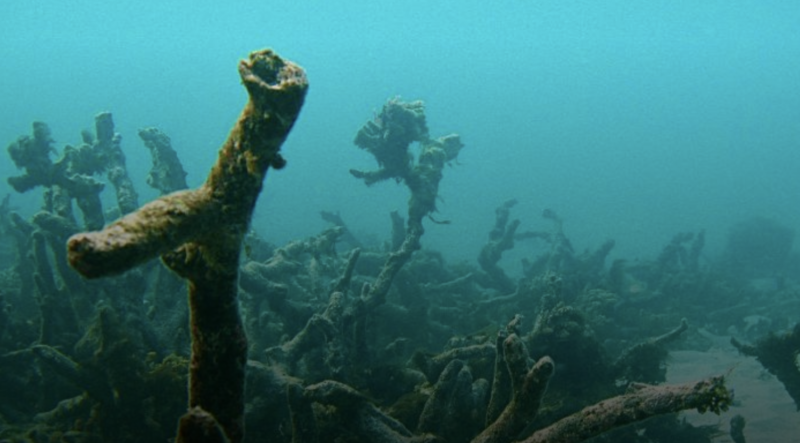Closing the loop between land and sea

I was prompted to write this post by a short radio piece on the ABC stating that the Great Barrier Reef is likely to suffer bleaching every two years in the future, because we haven’t acted to stop global warming. Here’s the audio, which was on The World Today, on Thursday 5 July 2018. (The piece ends with a brief recognition that farming also has its part to play in sustaining the health of the reef.)
Working on the Sugar vs the Reef? project over the last few years, we’re aware that much of our attention as artists has been drawn to the sugar side of things – to agriculture, to land use and how it affects water quality in the Reef – through the run-off of sediment, chemicals, pollution.
However, since we began our work in 2015, there have been two massive bleaching events in the Great Barrier Reef – each of these caused by elevated water temperatures, rather than the more localised effects of pollution from the land.
Water temperatures rise as the planet warms up due to fossil fuel burning. Unlike the run-off of pesticides, fertilisers and sediments from reef-side farms, the release of greenhouse gases from fossil fuels is not a “local” problem, so it’s much harder to fix.
Alarmed by the bleaching of the reef in 2016 and 2017, both big governments (Queensland and Federal) have announced a desire to “Save the Reef!”
But their initiatives to save the reef have never included cutting greenhouse gas emissions. Rather, they focus on the small and local, pointing the finger at what’s going on with agriculture and land-use rather than the giant elephant in the room – Australias continuing use of coal as a source of electricity, and of course the ongoing saga to release vast new reserves of low-grade coal via the Adani mine (which is not very far away from the sugarcane farms of Mackay).
I can only conclude that the injection of funds for “water quality improvement” to help save the reef are a form of smokescreen, to create the impression that something is being done, while in the meantime, coal continues to burn, guaranteeing that the planet will continue to heat up, and the reef will continue to bleach and die.
Recently $444 million was allocated by the Federal government to improve water quality, research coral resilience, battle crown of thorns starfish, improve monitoring, and engage with traditional owners along the reef coast.
You can read Jon Brodie’s analysis here – he is very critical of efforts so far to improve water quality, including the low take-up of best management practices in the sugarcane industry.
Quite apart from this, the major problem is that none of this new government money to save the reef was allocated to battling climate change. Brodie writes:
Herein lies the most significant criticism of the new funding package. It avoids any mention of reducing Australia’s greenhouse gas emissions, or of working closely with the international community to help deliver significant global reductions. Yet climate change is routinely described as the biggest threat to the reef.
Savvy farmers will apply for some of the $444 million to help them fund what they’re already hoping to do: invest in better systems to improve soil health and diversify crops. So this money is a welcome support for regenerative agriculture practitioners. But the missing piece of the puzzle is the possibility that done properly, farming can actually sequester carbon in the soil. If the government could get on board with this, and support farmers to draw down carbon dioxide through regenerative agriculture, they’ll be moving towards closing the loop between what’s going on in the sea, and what’s happening on the land.
– – –
PS: we met Jon Brodie back in 2016… here’s a post about our visit to his office in Townsville.

July 9, 2018 @ 12:11 pm
update – this article, published 6 July 2018, is the first indication I’ve seen that the tourism industry has begun taking the plight of the reef seriously:
https://www.smh.com.au/environment/climate-change/environment-is-our-economy-tourism-wakes-up-to-a-reef-in-peril-20180705-p4zpmp.html
and this is a follow up article from the following day:
https://www.smh.com.au/environment/climate-change/huge-step-tourist-industry-wakes-up-to-reef-s-climate-risks-20180706-p4zq0x.html